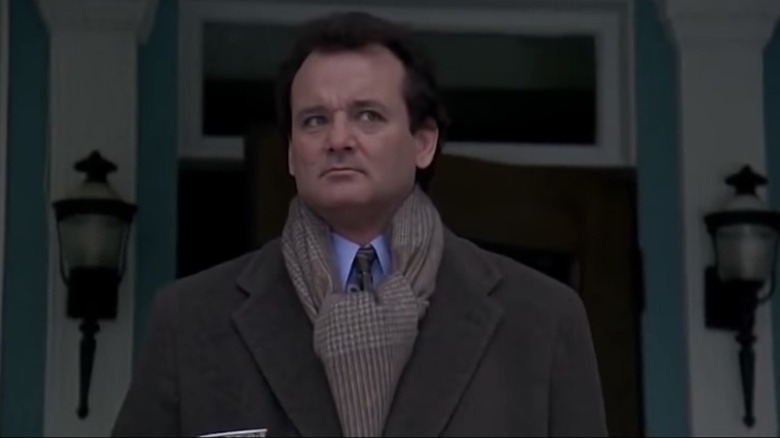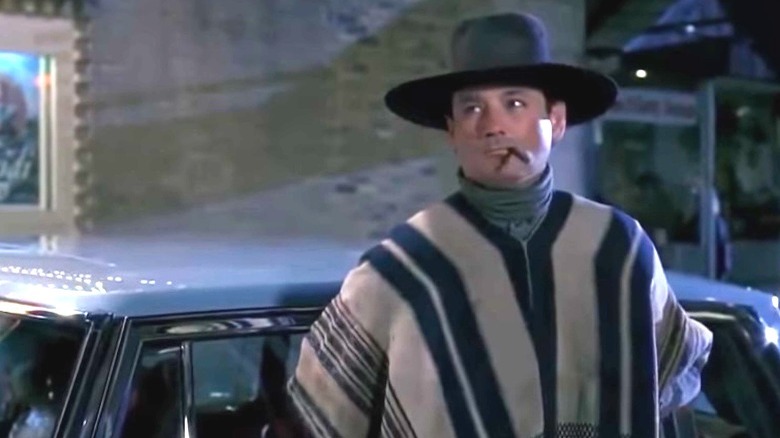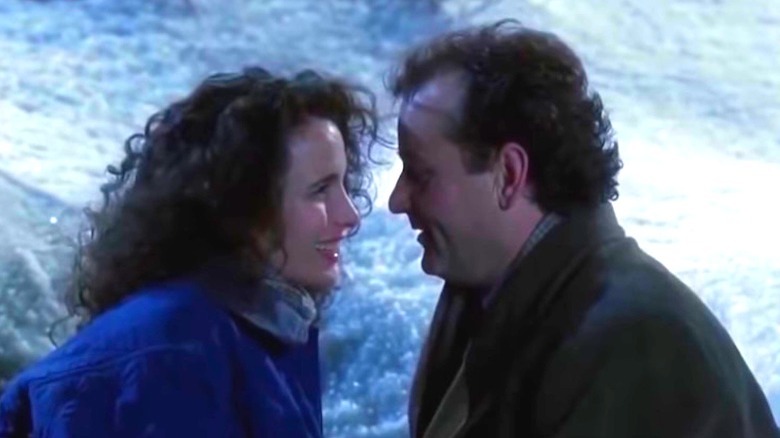Bureaucracy Stopped Bill Murray From Getting Full Credit For Groundhog Day
For a film about a Pennsylvania weatherman getting stuck in an endless time loop, watching "Groundhog Day" never gets old. Screenwriter Danny Rubin and director Harold Ramis are credited with creating one of the freshest scripts to hit Hollywood in the '90s, a story that blends absurdist humor, Buddhist thought, and heartwarming romance. By marrying Rubin's original script, which had struck the darker tone of an indie film, with Ramis' trademark slapstick comedy that delighted audiences in "Caddyshack," the two racked up a BAFTA in 1994 for best original screenplay. That award, and the screenwriting credit, would have been shared with Bill Murray — if not for a technicality with the Writer's Guild.
In an interview on NPR's "Fresh Air," the late director told Terry Gross that he wanted to give Rubin's contemporary spin on "It's a Wonderful Life" by adding more humor. Bill Murray, an alumnus of Chicago's famous Second City improv troupe, improvised many of Phil Connors' lines on set but was never given a co-writing credit due to the union's rules.
"I rewrote it myself and again got writing credit from the Writers Guild and then brought Danny back and rewrote it with Danny again. And then, on the set, of course, Bill Murray makes invaluable contributions, which would be credited if the Guild rules were not so strict ... I think when an actor improvises that brilliantly, you know, the Guild should have a way to recognize that. But they don't because there are these quantitative measures that they use.
Rewind
From its start, "Groundhog Day" was rooted in the Chicago improv comedy scene. In the mid '80s, Rubin was an improv artist and struggling local TV news freelancer in Chicago. Like Murray, Ramis made his bones at Second City, where he met his frequent collaborator, John Belushi. The premise of "Groundhog Day" is itself a callback to "rewind," an improv format used by Second City players. The practice sets up a scene, the players perform it and when someone says "rewind," the scene starts over in a different direction (via Chicago Tribune).
You can see Murray deploy the rewind technique throughout the film, bumping into Ned Ryerson every morning but trudging through the snow one day, trying to dodge him the next and finally deciding to embrace him. One of those moments is an example of where Murray went off script (via Good Housekeeping). When Ryerson once again greets Phil, Murray ad-libbed "Ned Ryerson! I have missed you. I don't know where you're headed. Can you call in sick?"
Other famous lines like "Don't drive angry!" and the final line, "We'll rent to start" are off-the-cuff Murray quips. As film critic Ryan Gilbey writes in "Groundhog Day," the actor's contributions amounted to more than a few wisecracks.
"Many of Phil's lines would be improvised by Murray, who sharpens the script's vague asides into poisonous zingers ... Other improvements are too numerous to list. Let us all simply be thankful that Bill Murray exists. Without him, comic improvisation would be a mediocre discipline in which pretty good might be good enough."
Rom-com improv
Murray's one-liners are his most quotable contributions to "Groundhog Day." It might surprise audiences to know that Connors' tender monologue to his love interest was mostly Murray. The scene marks a romantic turning point for Connors, who has tried in vain to get his producer, Rita Hanson, to sleep with him. By this point, he has come to truly care for Hanson and confesses that he has not only fallen in love with her beauty, but her kindness toward others. Ramis had concocted the scene, along with the sentimental score underpinning it, as part of his plan to emphasize the rom-com aspect of the film. As Rubin writes in his book "How to Write Groundhog Day":
"When the final script started to take shape, the declaration of love moved to the end of the second act, to the night when Rita tries to stay awake with Phil. I think much of that speech ended up being improvised by Bill ... By making it personal to him, I think he was better able to connect to the scene and make it feel real to the rest of us."
It's a tragedy that Murray didn't get a writing credit on "Groundhog Day." His monologue helped give the movie its heart and his wry wit delivered its best lines. Regardless of guild rules, it's improvisational humor like that which makes us want to rewatch "Groundhog Day" again and again and again.


